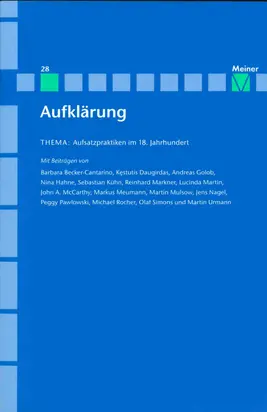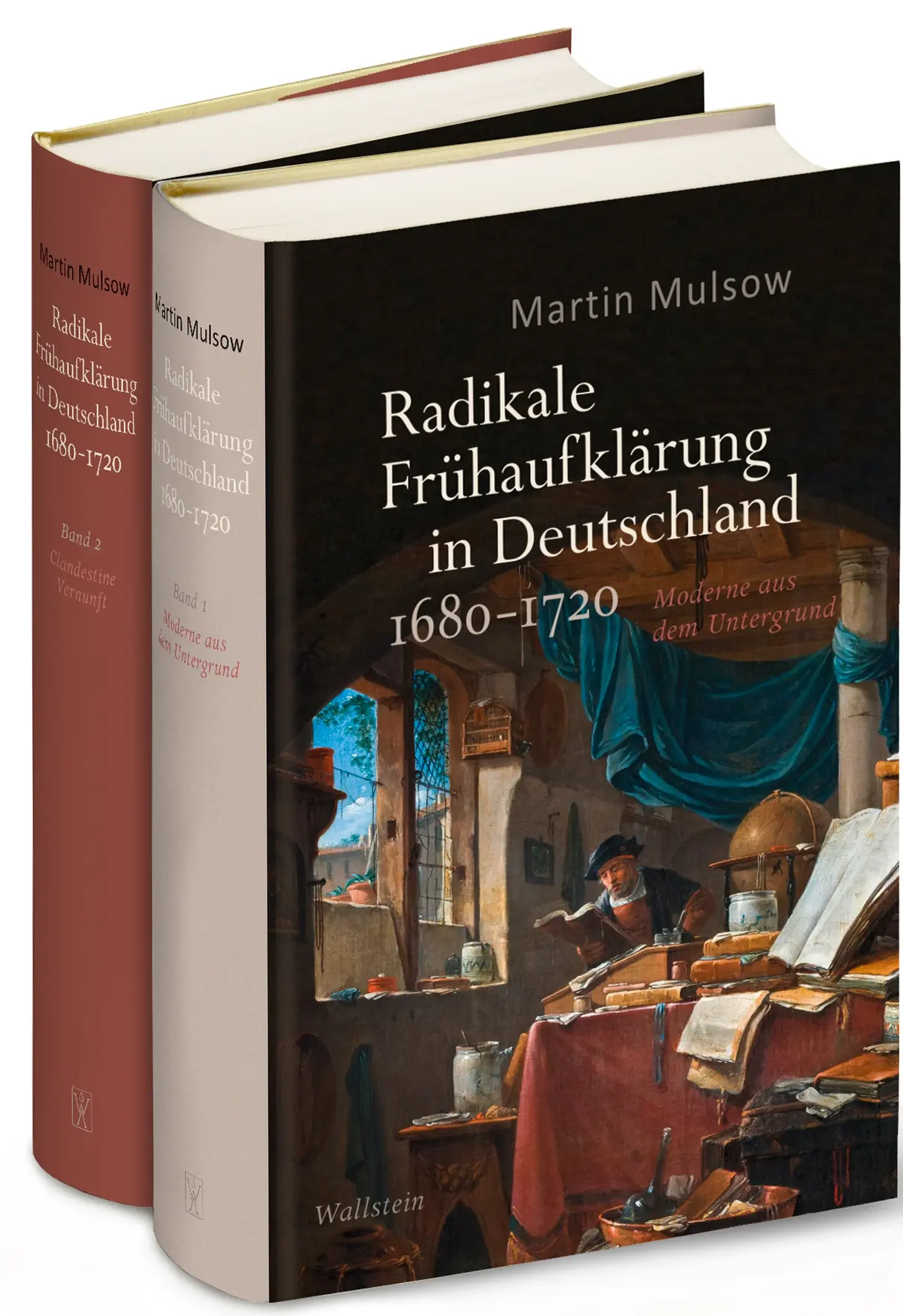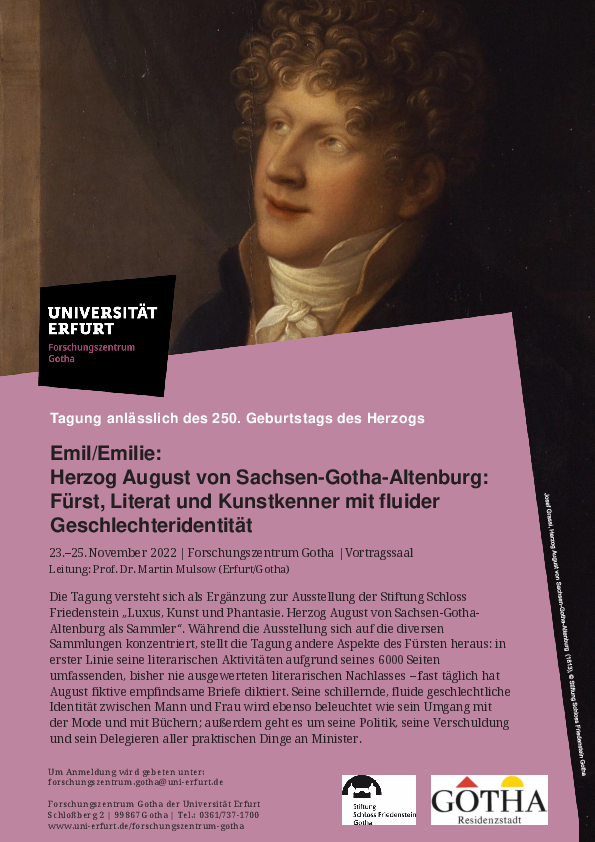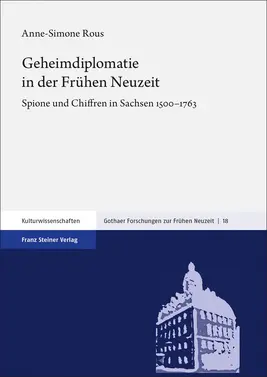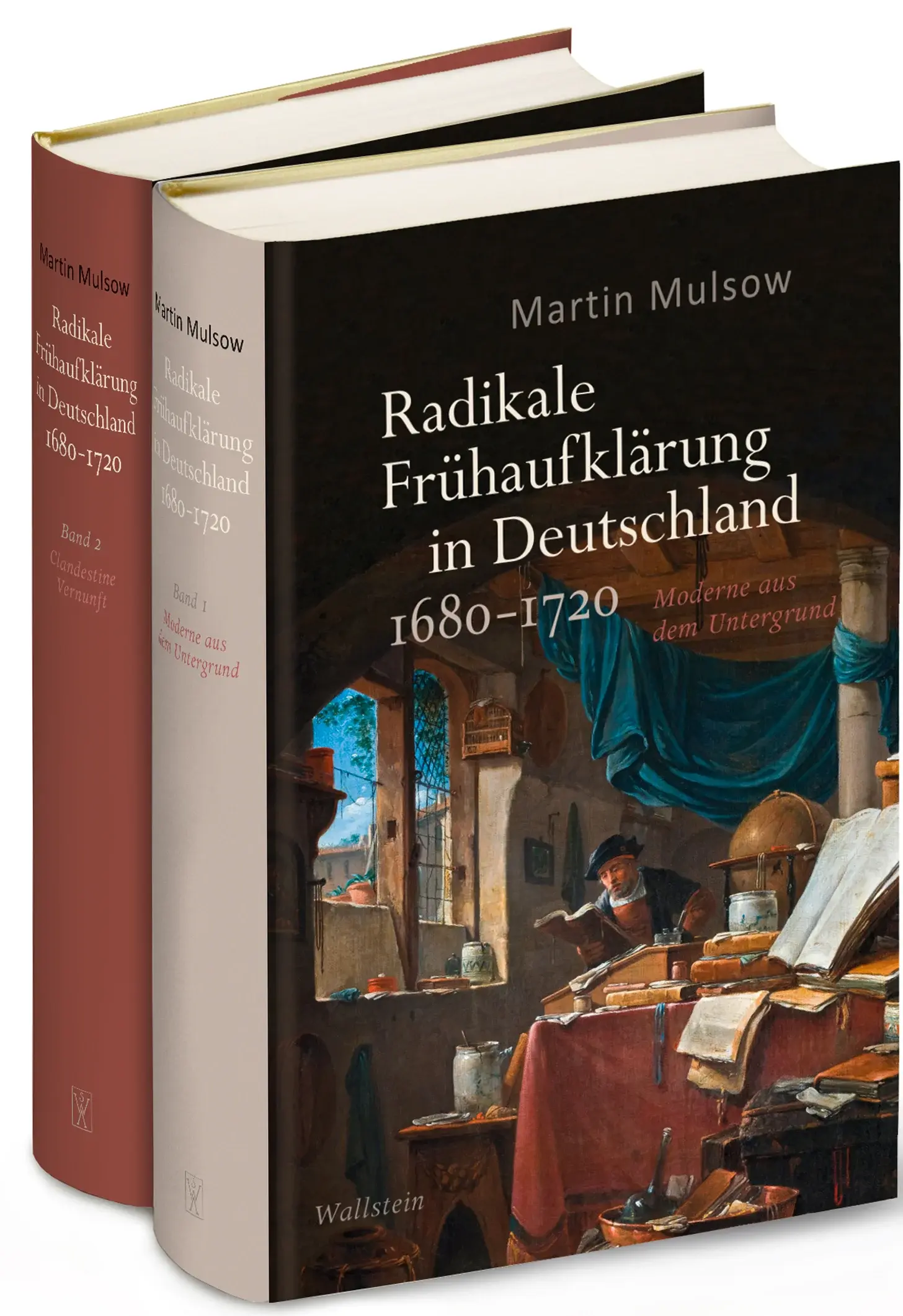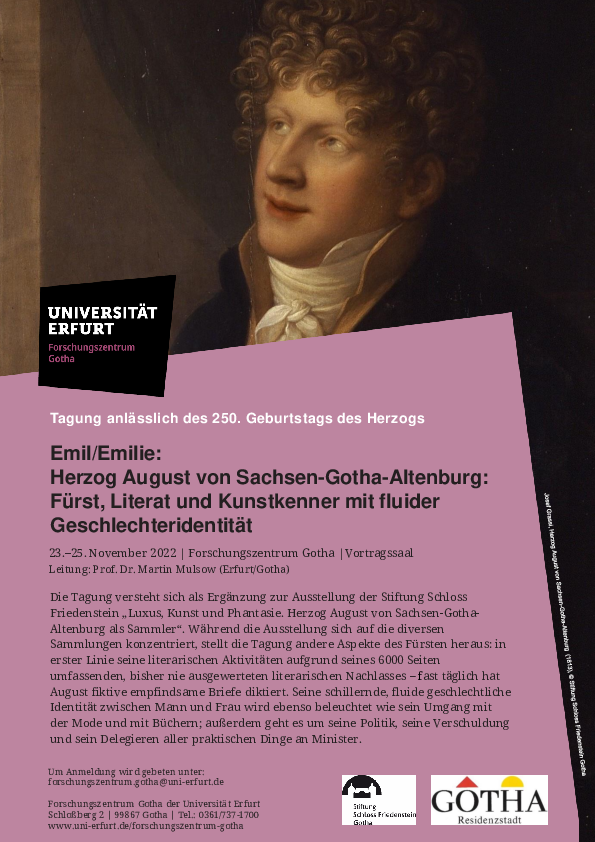The genesis of the unique Gotha collections is closely connected with the history of the Gotha court and the European court culture of the 17th and 18th centuries. The extremely rich holdings of the former Privy Archives also offer the opportunity to explore the structures of a medium-sized German residence city using the example of Gotha. The study of the Gotha court and its European interconnections in political as well as cultural terms are therefore among the principal research activities of the Gotha Research Centre. The topics range from classical historiographical questions such as politics, diplomacy, military and finance to the study of the Gotha court as an eminent cultural and scientific centre or the social reality of Africans at the German courts of the early modern period. The focus of corresponding studies is currently on court ceremonials, ducal finances, the history of knowledge of the Gotha military and the development of the corresponding sources, as well as the practices of secret diplomacy, the correspondence of the Gotha duchess Luise Dorothea (1710–1767), self-testimonies of noble court officials, the natural sciences at the court of Ernst II, and the person of the enlightened prince. In 2022, two major conferences on “Rudolph Zacharias Becker and Intellectual Gotha” and on Duke August outlined the broad panorama of science, arts and music in Gotha around 1800 and also examined the role of the city’s intellectual and middle-class milieu centred around the court.
The study of socialisation in the 18th century has also been one of the research centre's focal points for some time. First and foremost is research on the history of the Illuminati Order, whose knowledge production was initially investigated within the framework of a DFG project on the Illuminati essays of the late Enlightenment. This resulted in the Gotha Illuminati Research Base, which is now part of the overarching FactGrid project, and the Illuminati Research Unit, which regularly organises conferences and workshops and coordinates ongoing research on the history of the order, including the planned digitisation of the famous ‘Schwedenkiste’. In addition, the links with the order have brought the Masonic Lodge, founded in 1772, into focus. In 2023, a major exhibition by the Friedenstein Castle Foundation, conceived in cooperation with the Research Centre, will be dedicated to this topic.
In addition, the Enlightenment in all its facets represents a focus of research at the Gotha Research Centre. In terms of dates, this ranges from the early Enlightenment to the ‘saddle period’ around 1800 and in terms of content from the examination of historical-philosophical concepts of Enlightenment to the study of well-known authors such as Lessing, to the Radical Enlightenment and the exploration of the so-called underground, for example in connection with the postgraduate school "Religion and Enlightenment: Heterodoxy, Dissidence and Subversion 1650–1750," as well as banned books and genres such as pornography. In September 2023, an international conference marking the 300th anniversary of the birth of Friedrich Melchior Grimm (1723–1807), the eminent mediator of the ideas of the French philosophes in Central and Eastern Europe, will focus on the role of Gotha in his European networks.
Ongoing Projects
- Lessing's beginnings in the philosophy of religion (Magdalena Fricke)
- Emergence, preservation and transmission of ceremonial knowledge in the 18th century using the example of the Gotha court (Marian Hefter)
- The Noble Ego at the End of the Ancien Régime: The Diaries of Christian Georg von Helmolt and Karl Heinrich Julius von Salisch (Erik Liebscher)
- Duke Ernst II of Saxe-Gotha and Altenburg (1745-1804) between Science, Politics and Secret Society Activities (Marie Nosper)
- Studies on Military Cultures of Knowledge in Central Germany in the 17th and 18th Centuries. The Example of the Duchy of Saxony-Gotha-Altenburg (Michael Schwarz)
Completed dissertations
- Lessing's Rescues. History and genesis of a style of thinking. Berlin/Boston 2013 (Dr. Michael Multhammer).
- Conference"Being E(a)rnest. New Research on Ernst II of Saxe-Gotha-Altenburg" on November 13, 2019.
- Conference "GermanPornography in the Enlightenment," October 21-23, 2015
- Conference"Essays as Media of Character Formation and Human Leadership in the 18th Century" on June 25-27, 2015
Collected volumes
- Ulrich Beck, Martin Mulsow (eds.): Vergangenheit und Zukunft der Moderne. Berlin: Suhrkamp 2014.
- Jonathan Israel, Martin Mulsow (eds.): Radikalaufklärung. Berlin 2014.
- Michael Multhammer, Martin Mulsow (eds.): Criminals - Freethinkers - Alchemists. Spaces of the Underground in the Early Modern Period. Cologne 2014.
- Dirk Sangmeister, Martin Mulsow (eds.): Subversive Literature. Erfurt Authors and Publishers in the Age of the French Revolution (1780-1806). Göttingen 2014.
- Oliver Kann, Michael Schwarz (eds.): Militärisches Wissen vom 16. bis zum 19. Jahrhundert. Military and Society in the Early Modern Period 22 (2021).
- Martin Mulsow, Gunhild Berg, Julia Schmidt-Funke (eds.): Das Schloss als Hörsaal. Ludwig Christian Lichtenberg's "Lecture on Natural Theory" and the Residence-City Production of Knowledge around 1800. Stuttgart 2021.
Monographs
- Anne-Simone Rous: Secret Diplomacy in the Early Modern Period. Spies and Ciphers in Saxony 1500-1763. Stuttgart 2022.

